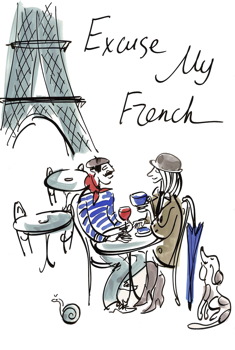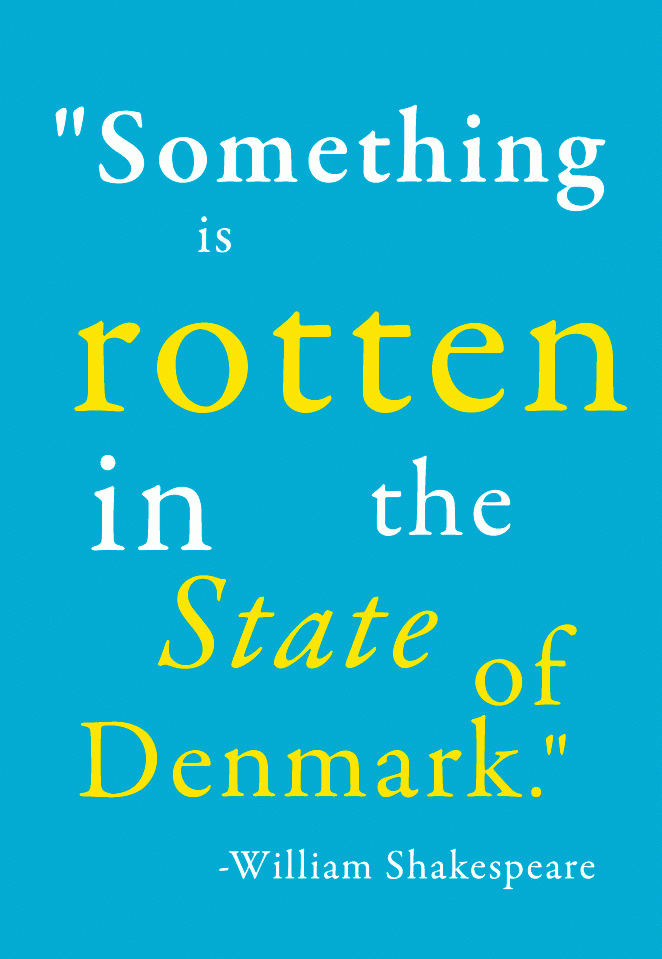 As the final of this year’s Eurovision hits our screens tonight, I thought it would be apt to focus attention on English sayings that include a reference to a European country, city, nationality or language.
As the final of this year’s Eurovision hits our screens tonight, I thought it would be apt to focus attention on English sayings that include a reference to a European country, city, nationality or language.
So let’s kick off this post on European sayings with three Dutch ones…
Double Dutch
One way to insult someone is to insult their language. This derogatory phrase originates from the historical contempt held by the English of their powerful economic rivals. It means gibberish, incomprehensible speech or a language that one doesn’t understand.
Dutch courage
This saying refers to bravery induced by alcohol. It alludes to the long-standing belief that the Dutch are heavy drinkers – a commonly held opinion among the English since the time of the Dutch Wars in the 17th and early 18th centuries.
Go Dutch
People use this expression when they want to share the cost of something equally. Hence an excursion or entertainment paid for in this way is a Dutch treat, and sharing the cost of meal in a restaurant is eating Dutch. American in origin, it’s believed to arise from the careful money management that characterised Dutch immigrant households in the early 20th century.
Excuse my French! / Pardon my French!
We use this idiom to apologise for swearing or use of offensive language. However, as both the speaker and the listener are well aware that the profanity is English, not French, it’s somewhat of a mock apology. The saying derives “from a literal usage of the exclamation. In the 19th century, when English people used French expressions in conversation they often apologised for it – presumably because many of their listeners (then as now) wouldn’t be familiar with the language”.

Something is rotten in the state of Denmark
One of the most recognisable lines in all of William Shakespeare’s works, this phrase from Hamlet is usually wrongly attributed to the troubled Prince of Denmark himself. However, it’s actually Marcellus, a palace guard, who says these infamous words after seeing the ghost of the dead king walking over the palace walls. In everyday conversation, it’s used to describe corruption or a situation in which something is perceived to be wrong.
Take French leave
This saying is used when making an unannounced or unauthorised departure from a party or other gathering. It originated from the custom prevalent in 18th century France of leaving a reception or entertainment without taking leave of one’s host or hostess. Interestingly, the French say the opposite – filer à l’anglaise – which literally means to “flee English-style”.
When in Rome, do as the Romans do
When you’re visiting a new place, this proverb recommends you should abide by the customs of that society. But it’s become synonymous with going with the flow, i.e. doing something because everybody around you is doing it. Due to its familiarity, it’s often used in the shortened version: When in Rome… As for its origins, it turns out that it’s all to do with the travel arrangements of a couple of early Christian saints. So now you know!
Over to you
I hope you’ve enjoyed this collection of European sayings. Any others that you’d care to add? Please share them in the comments below.
“Parler anglais comme une vache espagnole”, means “speaking english as a spanish cow”; Understand why french people have trouble with languages?
I’ve not heard of that one before! It seems a bit unfair when most French people have a far better grasp of English than we do of French…
“All roads lead to Rome” – said to mean that all the methods of doing something will achieve the same result in the end.
And what about “Dutch comfort / Dutch consolation” which means “cold comfort”? Do you use these expressions?
That’s a great one, thank you! I don’t know how/why I missed it?
I did come across the other two but didn’t include them as I’ve never heard or seen either of them being used – we tend to just say “cold comfort”. In fact, there are quite a few Dutch-related ones, including “I’m a Dutchman”, but I decided to pick the three most common ones.
Thanks a lot, Geraldine, for your lucid explanation. I thought as much about those two expressions I mentioned.
Glad to have been of assistance 🙂
Ah, I’d forgotten that charmingly xenophobic phrase, ‘filer a l’anglaise’ 🙂 and I didn’t realise we used it in English to insult the French…will the hundred years war never end??!
Yes, that one was new to me too. Thanks for stopping by!
Excellent post, as usual, thank you. I just read and savour every drop of all your posts. My faves are “go Dutch” and “excuse / pardon my French”. For the moment, have nothing to add 🙂
Thanks Tania. I really appreciate your lovely words!